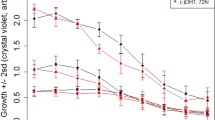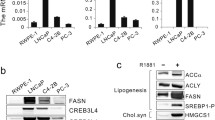Abstract
Calcitriol (1α,25-dihydroxycholecalciferol) suppresses the growth of prostate cancer cells. Growth suppression of hormone-sensitive LNCaP prostate cancer cells by calcitriol is believed to depend on androgens, but the mechanisms of the interactions between the calcitriol-and androgen-dependent signaling pathways is unclear. A previous search for calcitriol-responsive genes in LNCaP cells with cDNA microarrays has shown that calcitriol regulates the expression of the gene for the placental transforming growth factor β (PTGF-β), which suppresses prostate cancer cell proliferation. A study was made of whether expression of the PTGF-β gene is regulated by 5α-dihydrotestosterone and whether induction of this gene by calcitriol is androgen-dependent. Quantitative PCR showed that 5α-dihydrotestosterone increases the level of the PTGF-β mRNA. Neither 5α-dihydrotestosterone nor the antiandrogen Casodex affected the calcitriol-induced level of the PTGF-β mRNA. It was assumed that calcitriol stimulates production of PTGF-β independently of 5α-dihydrotestosterone and that its effect on prostate cancer cell growth is partly mediated by an androgen-independent mechanism.
Similar content being viewed by others
References
Miller G.J., Stapleton G.E., Ferrara J.A., Lucia M.S., Pfister S., Hedlund T.E., Upadhya P. 1992. The human prostatic carcinoma cell line LNCaP expresses biologically active, specific receptors for 1alpha,25-dihydroxyvitamin D3. Cancer Res. 52, 515–520.
Hsieh T., Wu J.M. 1997. Induction of apoptosis and altered nuclear/cytoplasmic distribution of the androgen receptor and prostate-specific antigen by 1alpha,25-dihydroxyvitamin D3 in androgen-responsive LNCaP cells. Biochem. Biophys. Res. Commun. 235, 539–544.
Zhuang S.H., Burnstein K.L. 1998. Antiproliferative effect of 1alpha,25-dihydroxyvitamin D3 in human prostate cancer cell line LNCaP involves reduction of cyclin-dependent kinase 2 activity and persistent G1 accumulation. Endocrinology. 139, 1197–1207.
Miller G.J., Stapleton G.E., Hedlund T.E., Moffat K.A. 1995. Vitamin D receptor expression, 24-hydroxylase activity, and inhibition of growth by 1 alpha,25-dihydroxyvitamin D3 in seven human prostatic carcinoma cell lines. Clin. Cancer Res. 1, 997–1003.
Horoszewicz J.S., Leong S.S., Kawinski E., Karr J.P., Rosenthal H., Chu T.M., Mirand E.A., Murphy G.P. 1983. LNCaP model of human prostatic carcinoma. Cancer Res. 43, 1809–1818.
Zhao X.Y., Ly L.H., Peehl D.M., Feldman D. 1997. 1alpha,25-dihydroxyvitamin D3 actions in LNCaP human prostate cancer cells are androgen-dependent. Endocrinology. 138, 3290–3298.
Qiao S., Pennanen P., Nazarova N., Lou Y.R., Tuohimaa P. 2003. Inhibition of fatty acid synthase expression by 1alpha,25-dihydroxyvitamin D3 in prostate cancer cells. J. Steroid Biochem. Mol. Biol. 85, 1–8.
Zhao X.Y., Peehl D.M., Navone N.M., Feldman D. 2000. 1alpha,25-dihydroxyvitamin D3 inhibits prostate cancer cell growth by androgen-dependent and androgen-independent mechanisms. Endocrinology. 141, 2548–2556.
Ahonen M.H., Zhuang Y.H., Aine R., Ylikomi T., Tuohimaa P. 2000. Androgen receptor and vitamin D receptor in human ovarian cancer: Growth stimulation and inhibition by ligands. Int. J. Cancer. 86, 40–46.
Escaleira M.T., Sonohara S., Brentani M.M. 1993. Sex steroids induced up-regulation of 1.25-(OH)2 vitamin D3 receptors in T 47D breast cancer cells. J. Steroid Biochem. Mol. Biol. 45, 257–263.
Nazarova N., Qiao S., Golovko O., Lou Y.R., Tuohimaa P. 2004. Calcitriol-induced prostate-derived factor: Autocrine control of prostate cancer cell growth. Int. J. Cancer. 112, 951–958.
Paralkar V.M., Vail A.L., Grasser W.A., Brown T.A., Xu H., Vukicevic S., Ke H.Z., Qi H., Owen T.A., Thompson D.D. 1998. Cloning and characterization of a novel member of the transforming growth factor-beta/bone morphogenetic protein family. J. Biol. Chem. 273, 13760–13767.
Hromas R., Hufford M., Sutton J., Xu D., Li Y., Lu L. 1997. PLAB, a novel placental bone morphogenetic protein. Biochim. Biophys. Acta. 1354, 40–44.
Bootcov M.R., Bauskin A.R., Valenzuela S.M., Moore A.G., Bansal M., He X.Y., Zhang H.P., Donnellan M., Mahler S., Pryor K., Walsh B.J., Nicholson R.C., Fairlie W.D., Por S.B., Robbins J.M., Breit S.N. 1997. MIC-1, a novel macrophage inhibitory cytokine, is a divergent member of the TGF-beta superfamily. Proc. Natl. Acad. Sci. USA. 94, 11514–11519.
Bottner M., Suter-Crazzolara C., Schober A., Unsicker K. 1999. Expression of a novel member of the TGF-beta superfamily, growth/differentiation factor-15/macrophage-inhibiting cytokine-1 (GDF-15/MIC-1) in adult rat tissues. Cell Tissue Res. 297, 103–110.
Strelau J., Bottner M., Lingor P., Suter-Crazzolara C., Galter D., Jaszai J., Sullivan A., Schober A., Krieglstein K., Unsicker K. 2000. GDF-15/MIC-1 a novel member of the TGF-beta superfamily. J. Neural Transm. Suppl. 60, 273–276.
Baek S.J., Horowitz J.M., Eling T.E. 2001. Molecular cloning and characterization of human nonsteroidal anti-inflammatory drug-activated gene promoter. Basal transcription is mediated by Sp1 and Sp3. J. Biol. Chem. 276, 33384–33392.
Krishnan A.V., Peehl D.M., Feldman D. 2003. Inhibition of prostate cancer growth by vitamin D: Regulation of target gene expression. J. Cell. Biochem. 88, 363–371.
Li P.X., Wong J., Ayed A., Ngo D., Brade A.M., Arrowsmith C., Austin R.C., Klamut H.J. 2000. Placental transforming growth factor-beta is a downstream mediator of the growth arrest and apoptotic response of tumor cells to DNA damage and p53 overexpression. J. Biol. Chem. 275, 20127–20135.
Tan M., Wang Y., Guan K., Sun Y. 2000. PTGF-beta, a type beta transforming growth factor (TGF-beta) superfamily member, is a p53 target gene that inhibits tumor cell growth via TGF-beta signaling pathway. Proc. Natl. Acad. Sci. USA. 97, 109–114.
Baek S.J., Kim K.S., Nixon J.B., Wilson L.C., Eling T.E. 2001. Cyclooxygenase inhibitors regulate the expression of a TGF-beta superfamily member that has proapoptotic and antitumorigenic activities. Mol. Pharmacol. 59, 901–908.
Liu T., Bauskin A.R., Zaunders J., Brown D.A., Pankhurst S., Russell P.J., Breit S.N. 2003. Macrophage inhibitory cytokine 1 reduces cell adhesion and induces apoptosis in prostate cancer cells. Cancer Res. 63, 5034–5040.
Author information
Authors and Affiliations
Additional information
Original Russian Text © N.Yu. Nazarova, G.I. Chikhirzhina, P. Tuohimaa, 2006, published in Molekulyarnaya Biologiya, 2006, Vol. 40, No. 1, pp. 84–89.
Rights and permissions
About this article
Cite this article
Nazarova, N.Y., Chikhirzhina, G.I. & Tuohimaa, P. Calcitriol induces transcription of the placental transforming growth factor β gene in prostate cancer cells via an androgen-independent mechanism. Mol Biol 40, 72–76 (2006). https://doi.org/10.1134/S0026893306010110
Received:
Issue Date:
DOI: https://doi.org/10.1134/S0026893306010110




